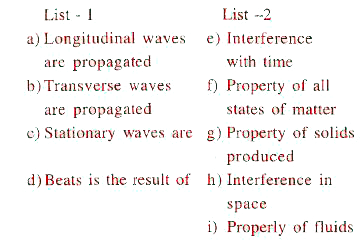(A) : Transverse waves are not produced in liquids and gases.
(R): Light waves are transverse waves.
Both 'A' and 'R' are true and 'R' is the correct, explanation of 'A'.
Both 'A' and 'R' are true and 'R' is not the correct explanation of 'A'
A' is true and 'R' is false
Both 'A' and 'R' are false
The correct Answer is:B
To analyze the statements given in the question, let's break it down step by step:
Step 1: Understand Statement (A)
Statement (A) claims that "Transverse waves are not produced in liquids and gases."
- Explanation: Transverse waves are characterized by particle motion that is perpendicular to the direction of wave propagation. In solids, particles can move in such a way that allows for the formation of crests and troughs. However, in liquids and gases, the particles do not have a fixed shape and cannot support shear stress, which is necessary for the formation of transverse waves. Therefore, this statement is true.
Step 2: Understand Statement (R)
Statement (R) claims that "Light waves are transverse waves."
- Explanation: Light waves are indeed electromagnetic waves, which are transverse in nature. In these waves, the electric and magnetic fields oscillate perpendicular to the direction of wave propagation. Thus, this statement is also true.
Step 3: Analyze the Relationship Between (A) and (R)
Now, we need to determine whether statement (R) is a correct explanation of statement (A).
- Analysis: While both statements are true, statement (R) does not explain why statement (A) is true. The fact that light waves are transverse does not provide any reasoning or explanation for the inability of transverse waves to be formed in liquids and gases. Therefore, statement (R) is not a correct explanation of statement (A).
Conclusion
Based on the analysis:
- Both statements (A) and (R) are true.
- Statement (R) does not explain statement (A).
Thus, the correct option is: A and R are true, and R is not the correct explanation of A.
Final Answer
The correct answer is option B.
---
Statement (A) claims that "Transverse waves are not produced in liquids and gases."
Statement (R) claims that "Light waves are transverse waves."
Now, we need to determine whether statement (R) is a correct explanation of statement (A).
Based on the analysis:
- Both statements (A) and (R) are true.
- Statement (R) does not explain statement (A).
The correct answer is option B.
Topper's Solved these Questions
- WAVESBOOK - AAKASH SERIESCHAPTER - WAVESEXERCISE - EXERCISE-II (Wave Equations & Basics :)
19 Videos
- WAVESBOOK - AAKASH SERIESCHAPTER - WAVESEXERCISE - EXERCISE-II (Strings (Speed of a travelling wave:))
23 Videos
- WAVESBOOK - AAKASH SERIESCHAPTER - WAVESEXERCISE - EXERCISE-IA (Matching )
4 Videos
- WAVE OPTICSBOOK - AAKASH SERIESCHAPTER - WAVE OPTICSEXERCISE - PROBLEMS (LEVEL - II)
33 Videos
- WAVES OPTICSBOOK - AAKASH SERIESCHAPTER - WAVES OPTICSEXERCISE - EXERCISE -III (POLARISITION)
10 Videos
Similar Questions
Which of the following expressions is that of a simpleharmonic progressive wave ?
View SolutionThe length of a string attached to two rigid supports is 40 cm. The maximum wavelength in cm of a stationary wave produced on it is :
View SolutionMatch the following

View SolutionIn Young's double-slit experiment, the y-coordinate of central maxima and 10th maxima are 2 cm and 5 cm, respectively, When the YDSE apparatus is immersed in a liquid of refractive index 1.5, the corresponding y-coordinates will be
View SolutionA ray of light is incident on the surface of a glass plate of refractive index √3 at the polarising angle . The angle of incidence and angle of refraction of the ray is
View SolutionAssertion: Transverse waves are not produced in liquids and gases. Reason: Light waves are transverse waves.
View SolutionLight waves are transverse in nature .
View Solutionगैसों में अनुप्रस्थ तरंगे क्यों उत्पन्न की जा सकती है?
View SolutionWhy is it that transverse waves cannot be produced in a gas? Can the transverse waves be produced in solids and liquids?
View SolutionA: Light waves can be polarised.
R: Light waves are transverse in nature.
View SolutionWhy is it that transverse waves cannot be produced in a gas? Can the transverse waves be produced in solids and liquids?
View SolutionWhat are longitudinal and transverse waves ?
View SolutionExplanation: Transverse waves do not occur in liquids and gases. Reason: Light waves are transverse waves.
View Solution(A) : Transverse waves are not produced in liquids and gases.
(R): Light waves are transverse waves.
View Solution(A) : Waves produced by a motor boat sailing in water are both longitudinal and transverse waves.
(R): The longitudinal and transverse waves cannot be produced simultaneously.
View SolutionTransverse waves are produced only in _ and liquids.
View Solution

